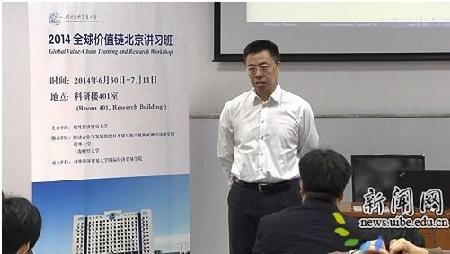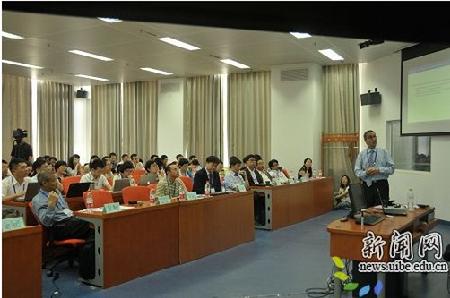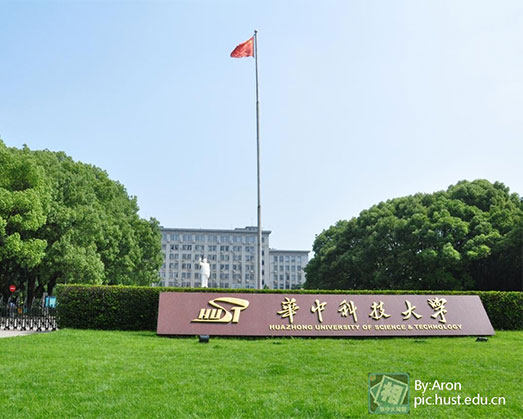2014 Global Value-Chain Training and Research Workshop
2014 Global Value-Chain (GVC) Training and Research Workshop, organized by University of International Business and Economics (UIBE) and co-sponsored by Organization for Economic Cooperation and Development (OECD), Institute of Developing Economies, Japan External Trade Organization (IDE-JETRO), Tsinghua University and Shanghai University of Finance and Economics was held successfully in Jun. 30th-Jul. 11th, 2014. The workshop aimed at building a global network, setting up a preponderant discipline platform and leading the academic trend.
Ministry of Commerce of the People’s Republic of China has provided full support and guidance to the workshop: ZHANG Xiangchen, Assistant Minister, addressed the opening ceremony; and XU Qingjun, Director of Division of World Economy, Policy Research Department of Ministry of Commerce, gave a lecture on the research on and policy application of value-chain in China and interacted with the participants directly. Prof. ZHAO Zhongxiu, Vice President of UIBE, was fully involved in the workshop and chaired the lectures. School of International Trade and Economics and Department of International Relations, UIBE hosted the workshop.

The era of GVC has arrived with the deepening of globalization, while the current research on GVC focuses on Gross Trade Accounting, the governance of GVC, the upgrading of GVC (mechanisms, types and paths) and the status, proportions, employment distribution and policy choices of various countries’ industries in GVC. Held as part of the Summer School of UIBE, 2014 GVC Training and Research Workshop can be described as high-end, cutting-edge and professional.
High-end
The workshop invited world-class GVC experts to give lectures, for example, Pol Antràs, professor of economics of Harvard University and the leading figure of New-New Trade Theory, Prof. Gary Gereffi, Director of Duke University Center on Globalization, Governance & Competitiveness and the founder of the concept and framework of GVC, Prof. Richard Baldwin from Graduate Institute, Geneva, renowned global trade economist and the founder of VOX, Satoshi Inomata, Chief Senior Researcher of IDE-JETRO and the designer of Trade in Value Added (TiVA), Nadim Ahmad, Head of the Trade and Business Statistics Division of the OECD’s Statistics Directorate and chief of WTO-OECD TiVA Initiative, Prof. John Whalley from University of Western Ontario, authority on Computable General Equilibrium (CGE) theories, Dr. Wang Zhi, senior economist of United States International Trade Commission, who put forward the Multi-Stage Reconciliation Method to Construct Inter-country Input-output Database, Prof. Shangjin Wei from Columbia University, Prof. Wang Fei from School of International Trade and Economics, UIBE, famous CGE expert in China, Prof. Ju Jiandong from Tsinghua University and young and middle-aged scholars from IDE-JETRO, National University of Singapore and the Johns Hopkins University who know quite a lot about GVC.

Cutting-edge
The workshop provided the latest research achievements on GVC around the globe. The cutting-edge academic proceedings in areas such as trade theories of GVC, empirical studies of trade, gross trade accounting and trade policies were covered by the lectures. The following topics were involved: The Margin of Global Sourcing, Organization of the Global Value-Chain, Macroeconomic Implications of Global Value Chains, CGE and GVC Evolution, Geometry of Global Value Chains, Global Value Chains, Upgrading and Competitiveness: The Role of Emerging Economies, How Does a Country’s Firm or Domestic Region Engage Global Value Chains?, Domestic Value Added in Chinese Exports: Firm-level Evidence, Domestic Value-added in China’s Exports and Its Distribution by Firm Ownership, Tracing China’s CO2 Emissions in Global Supply Chains, etc.
Professional
The purpose of the workshop is to cultivate young and middle-aged experts who are committed to the research on GVC in
The workshop has important implications for the research on GVC in
Building a Global Network
World Trade Organization (WTO), OECD, International Monetary Fund (IMF), European Union (EU) and institutes from some countries have conducted in-depth research on GVC gross trade accounting and have achieved various results. The large-scale research on GVC requires the joint efforts of the governments, academy and business as well as the researchers and institutes in all countries. 2014 GVC Training and Research Workshop provided a great opportunity for
Setting up a Preponderant Discipline Platform
The concept of GVC interacts closely with the global trade pattern and the distribution of welfare. Therefore, advancing the research on GVC and TiVA can help reflect on the objective trade conditions between a country and its major trade partners, the true scale of a country’s foreign trade, the influence of foreign trade on domestic economic development and employment, and the international competitiveness of various industries as well as their status in GVC. GVC contributes to understanding trade balance on an objective basis, calculating global trade with TiVA, restore the pattern of global trade under the context of economic globalization and international division of labor and accurately reflecting the welfare of various countries in international trade, and has already exerted a far-reaching influence on international production, trade and investment. Under these circumstances, the development of the discipline—international trade—in China should keep up with the times and conduct research on the changes GVC has brought towards international division of labor and the distribution of trade welfare, so that it can play an important role in strengthening the coordination of macroeconomic policies between China and other countries, deepening the understanding of GVC and applying it to the policy suggestions of China’s transformation of economic development pattern and upgrading of foreign trade structure.
Leading the Academic Trend
The importance of GVC research was further highlighted by the approval of APEC Strategic Blueprint for Promoting Global Value Chain Development and Cooperation, Strategic Framework on Measurement of APEC TiVA under GVCs and other agreements in 2014. In addition, GVC will be an important topic in the coming G20 Trade Ministers Meeting, which aims at driving global economic growth. Also, as Premier Li Keqiang emphasized in his report on government work this year, the development of science and technology as well as economy and society should be closely interacted so that
News&Opinion
 more
more- Islamic school in Xinjiang to double enrollment
- Stop Blaming Colleges for Society's Problems The...
- China's new code of conduct for students trigger...
- Chengdu education goes global with more int’l co...
- Special needs education spending increased in Ch...
- China Academy of Translation launched in Beijing
- Foreign Teacher Training Institutions: The Only ...
- 298 people on board crashed Malaysian flight, 15...
Policy&Laws
Guilin to offer 72-hour visa-free stays
GUILIN - The city of Guilin in South China's Guangxi Zhuang autonomo...
further strengthening the visa regulation of int...
After the promulgation of new Immigration Control Act in China, Entr...
New Regulations for Visa
Attention Dear all, The laws and regulations for visa (residenc...





 print
print  email
email  Favorite
Favorite  Transtlate
Transtlate 







